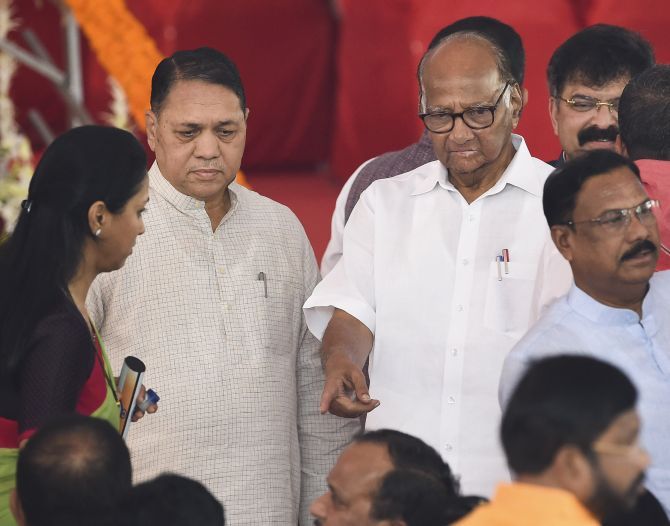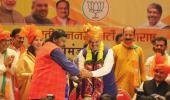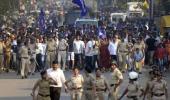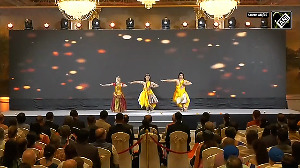Sharad Pawar claims he is not in a position to name the organisations behind the violence at Bhima Koregaon, 'though active role of right-wing forces behind the violence cannot be ruled out.'
Jyoti Punwani reports.

After all the noise he has made about the need for a fresh investigation into the Bhima-Koregaon violence, Sharad Pawar's affidavit filed before the Bhima-Koregaon Commission of Inquiry into the events of January 1, 2018 and thereafter, turns out to be a damp squib.
The affidavit indicts the Maharashtra police and the Devendra Fadnavis-led government, but does not name anybody.
Instead, the affidavit talks in generalities about 'anti-social elements instigating violence for gaining political mileage, historical facts concocted and maliciously propagated through social media, rumour mongering through WhatsApp groups'.
'The menace of uncontrolled social media' dominates the affidavit, which calls for amendment of the Criminal Procedure Code, the Bombay Police Act and the IT Act, to enable the police to handle serious riot-like situations without political interference.
In what would come as a shock to political activists, the affidavit, arguing for the need to make the police more effective, specifically cites how the violation of Section 144 (banning the assembly of 5 or more persons), is not taken seriously, since the offence is bailable and compoundable.
In his affidavit, Pawar claims he is not in a position to name the organisations behind the violence at Bhima Koregaon, 'though active role of right-wing forces behind the violence cannot be ruled out.'
The Bhima Koregaon violence refers to the clashes that broke out on January 1, 2018, after saffron-flag carrying men reportedly attacked Dalits heading towards Bhima Koregaon, 118 km from Pune city.
Lakhs of Dalits had set out to observe the 200th anniversary of the battle between the British and the Peshwas, won by the British with the help of Mahar soldiers.
The clashes claimed the life of 28-year-old Rahul Phatangade. Two days later, on January 3, 2018, a state-wide bandh was observed at the behest of Dalit groups led by Prakash Ambedkar. The bandh also saw clashes and one death of 16-year-old Yogesh Jadhav in a police lathi charge.
Hindutva leaders Sambhaji Bhide and Milind Ekbote were the first to be named as accused in the first FIR filed in the case.
Ekbote is out on bail, but Bhide was never arrested. Then chief minister Devendra Fadnavis gave him a clean chit on the floor of the House.
A judicial inquiry was set up by the Maharashtra government to probe the violence at Bhima Koregaon and during the bandh.
Pawar's affidavit indicts the police and the state government for having failed to prevent and control the violence, due to lack of political will.
'It is not possible for anti-social elements with such strong political vendetta to gather in such large numbers without failure of the law enforcing agency,' says the Nationalist Congress Party president's affidavit.
The affidavit traces the violence to happenings before January 1, 2018, when 'social media was widely used in vernacular languages to instigate violence and create rift between two communities'.
In two reports, Rediff.com had mentioned the WhatsApp messages calling upon Marathas to observe a bandh on January 1, 2018.
Pawar's affidavit also describes the growing tension between Dalits and non-Dalits in Maharashtra.
It points out that this was the first time violence had broken out on January 1, at Bhima-Koregaon.
Talking about the 'peaceful social fabric' of the state, it says: 'There is vast cultural, social and political diversity in Maharashtra, but this particular state has always been a mantle holder for peaceful existence of many socially backward communities'.
The affidavit then says that Maharashtra has a strong undercurrent of 'caste identity'.
The process of urbanisation has led to a 'social, cultural and demographic makeover' in the state's big cities, where this undercurrent has started flaring up due to 'issues of unemployment, social discrimination, lack of economic opportunities'.
Coming to measures to prevent such occurrences in future, the affidavit says amendments to the CrPC, the Bombay Police Act and the IT Act, as well as a strong cyber cell, could enable the police to nab those who indulge in rumour mongering through social media and instigate violence in the name of religion and caste.
The affidavit requests the commission to recommend such amendments.
To make such a recommendation meaningful, says the affidavit, the Commissions of Inquiry Act itself would have to be amended to make such commissions more effective.
The Bhima Koregaon case is the one single theme on which Pawar has been most vocal in the last two months.
In what was seen as a pre-emptive move, the National Investigation Agency suddenly took over the case in January from the Pune police, just when Pawar began demanding an special investigation team to probe the violence.
Pawar has often criticised the arrests made by the Maharashtra government of nine well-known Left activists for the violence.
Even after the NIA's takeover of the case, the veteran politician kept stressing the need for an SIT, pointing out that the NIA Act permitted the Maharashtra government to conduct a parallel investigation.
However, his affidavit, dated September 2019, mentions nothing about the investigation or arrests.











 © 2025
© 2025